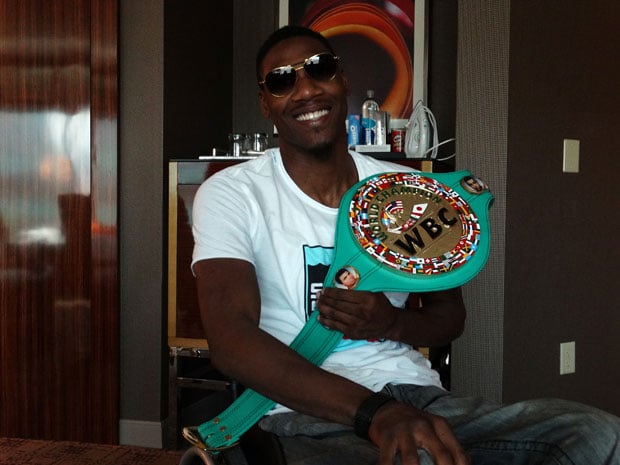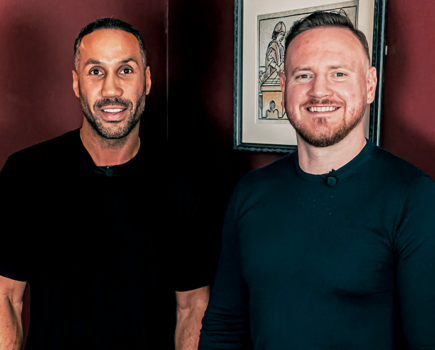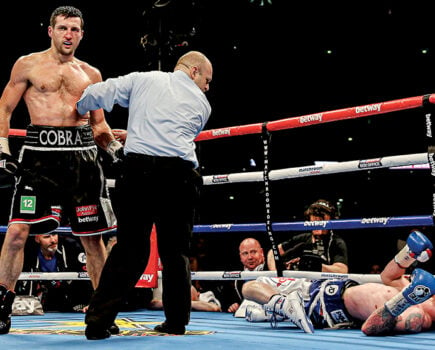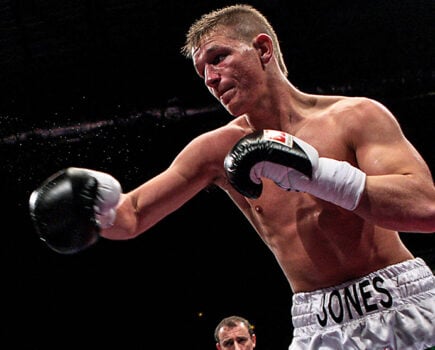“YOU already know how I would fight Floyd Mayweather, the same way I fought everybody. Either he’s going to get me or I’m going to get him. You know what I’m sayin’? Floyd’s the type of fighter you can’t box. He’s too fast, he’s too good. He’s got a lot going for him.
“Floyd can’t deal with a guy who’s really coming to fight. You can’t be a guy that throws five, six punches and waits. From the moment you hear the bell ‘Ding’ you’ve got to be on him all night. You’ve got to fight the whole three minutes.
“The only way he’s gonna shut me down is if I get caught like Sergio Martinez got me. That’s the only way. You have to give a man respect and his props and all that, he’s good at what he does, but Castillo didn’t give him time. Everything you get against Mayweather you’ve got to earn it. And he’d have to earn a lot because I have a lot to give.”
Downstairs, and a few hours later, Marcos Maidana applies the pressure to Floyd Mayweather but it is not enough.
But here and now, in a spacious suite on the 28th floor in the MGM Grand Hotel and Casino in Las Vegas, Paul Williams talks about how he would beat the pound-for-pound king.
There’s enthusiasm in his voice yet a resigned message simmers beneath his tones.
As he raises his fists to explain how he would dethrone Mayweather – using his incredible physical fighting gifts as a 6ft 1ins welterweight – his hands return to rest on his legs.
Perhaps sub-consciously he squeezes them.
That they do not register the pressure doesn’t interrupt the flow of conversation, but throughout the discussion his hands move from his lap, returning with a press or a gentle prod.
I’m sat on a rather luxurious couch. Williams is in his wheelchair. Two years ago he crashed his motorbike, leaving him paralysed from the sternum down.
The hands can feel the legs, the legs don’t feel the hands.
The week before
The bout with Saul Alvarez is agreed. It is called a $20million fight and marks young Mexican idol’s first foray into the pay-per-view market.
Williams is his acid test.
There is a school of thought that, following hard fights with Sergio Martinez and Erislandy Lara and a subsequent one-punch knockout defeat to Martinez, that the tall “Punisher’s” best days have past him by.
His fiancé was online when she told him the deal had been done for the contest, “’They got you fighting Alvarez’.
I said, ‘They’ve got me fighting everybody.’
“They were talking about a $20million fight and this and that and I said, ‘For real?’ I said, ‘I’m going to go out to this wedding tomorrow, then me and Mr Peterson [trainer George Peterson] will fly back to DC and set up camp.”
Williams believed he would scalp the up-and-coming Mexican and move on to bigger things once more.
He wanted to give Alvarez the kind of gut-check he’d given feared Antonio Margarito.
“I got to the point now, ‘Let me test your heart’, and I found a lot of guys are soft,” Williams remembers. “That’s what I see now, with the guys coming up they’ve never been tested. Of course, when I started out they gave me some tomato cans, then they fed me some cab drivers. Then they fed me some pork chops and Margarito was my steak. I proved it. These guys now they give them cab drivers and tomato cans and then they give them a little pork chop and they can’t even bite through that so how are they going to bite through a steak?
“If I fought Canelo, of course he’s going to get his shots in, like everybody, but I was his steak. I was going to be that steak he didn’t want to bite through. Mayweather, he knew that. He’s like, ‘Canelo, he’s never been tested’ and he was right. How would he have felt in the deep water if – in the first couple of rounds – he’s getting busted up and it ain’t going his way? How would you answer that? No one knew. Look at [Adrien] Broner. The first time he had a fight and it wasn’t going his way he didn’t know how to adjust. He stopped throwing punches and got embarrassed and stuff because he stopped punching. if he kept letting his hands go, that keeps your opponent at bay.
“When those guys be in a fight, and you see the guy that’s got all the hype around, he’s only doing his thing but as soon as a dude starts hitting him he stops punching.”
The crash
It is 7am on May 27, 2012, his brother’s wedding day. Paul Williams is on his hornet yellow custom-built Suzuki Hayabusa 1300. “It was a normal day,” he recalls, fondly showing off a picture of the beloved beast on his cell phone.
One minute he’s heading home to collect his tuxedo, the next he’s lying in a crumpled heap on a grassy embankment having been flipped from his bike and “folding like a suitcase” on impact.
He hears the sirens of the ambulances coming to his aid. He registers the flashing lights.
“I asked them not to cut my pants or my belt. I had a $4,000 belt on and I had a lot of cash on me.
“The funny thing about it was there was no pain at all. None. They got me on the ambulance and all that stuff and I’m thinking, ‘This can’t be true. I can’t get up. Something’s got to be more wrong than they’re saying. I’ve got a big fight coming up, I’ve got my brother’s wedding today’.”
Tubes are fed into his lungs to help him breathe. His eyes, nose and ears are filled with mud from the wreck.
He attempts to wiggle his toes in anassessment of the damage.
“You try to move them and stuff, you know in your head, you don’t know if they’re moving and I couldn’t see because of all the dirt and stuff. I tried to get up. For some reason it felt like I was still on the bike.”
Short-term pain is absent, though a long-term battle has begun.
Despite the news, his brother’s nuptials go ahead but the reception is cancelled so they can be by Paul’s bedside.
“They had their honeymoon but it was hard on them,” Williams admits.
It was harder on him, though.
He was devastated, learning how to live and function in the wheelchair.
“That’s the biggest thing I had to overcome, not controlling when you go to the bathroom,” he remembers. “That was my hardest part. ‘This ain’t me,’ I thought.”
He wouldn’t see visitors, did not want photos taken and had little interaction.
“No pictures, no nothing,” he says. “I was like a ghost in there.”
Gradually, the nurses encourage him to put images of his boxing career on the walls of his room.
“You can’t be playing dead,” they say. “You ain’t dead.”
So he starts living.
More people come, more pictures go up and he feels more comfortable. He even relaxes a little.
There are wired patches on his legs and the muscles start twitching. There’s life in them once more, the fibres reacting to the electric pulses chasing through them.
Williams is told the paralysis is like a roadblock, that one day it could clear and the signals will be sent around his body and it might function how it used to.
He vigorously attends rehabilitation in hope, but begins to live with what has happened and stops going to the sessions.
He wants to restart, to give him the best chance of downing the blockage.
“I got to jump back on that,” he admits. “I guess I dropped the ball. They basically told me there’s nothing they could do for me because I do everything on my own. I could go in and use the machines and stuff, I can go on the bikes or whatever, but that’s about it. I got to the point that I was just doing my everyday life, just me doing me. That’s one thing I wish I’d stayed on more – who knows what might have happened by now – other than that I’m just being me.”
Steak night
It’s October 2007 and Williams is undefeated in 32 contests before ‘steak night’ – against Antonio Margarito – in Carson, California.
Both are being spoken about in terms of being the most-avoided, dangerous fighters out there. The queue to meet them is so short they wind up with one another.
“I called out all them guys,” says Williams. “Them guys knew. Them guys didn’t want to see me.
“I want to see what you’re like when it gets hot in there. How are you gonna act?
“This is a sport that says, ‘Where are your kahunas at?’ You can play baseball, you can play basketball, you can play all the other sports. You can’t play boxing. It’s the fight game.
“I wanted to have a style that would test these guys. That was my key and when I figured that out it was easy. They were more scared of me so that gave me one round already before I got in the ring I then just had to get in there and start throwing punches.”
Margarito had a similar outlook. The Mexican warrior, who’d happily be at home in the bad guy role of a Tarantino flick, wanted to test Paul’s mettle and see if there was substance behind the southpaw stance, reach and workrate.
“Butterflies, you have all kinds of crazy things going through your head,” Williams smiles, leaning forwards in his chair. “Ah man, you get in the ring, you hit the gloves together and all that. You come back to the corner, you know you’ve got a couple of seconds before the fight. Ah man, it would be killing me. Ah man. Then ‘Ding’ and it was time to fight. Let’s go. I’m coming out to get mine so you better get yours. Then, after hitting them a few times I could hear some of them crying and I was like, ‘Man, hold up.’ I couldn’t believe it.
“Margarito was one of the nights when I was going to show the world,”
Williams grins. “In that era we were supposed to be the next generation. I wanted to show them I was the top dog so if you wanted to fight for titles or you wanted to run through anybody, you had to see me.”
“When I fought Margarito, being on the outside was easy and I told my coach Mr Peterson I was bored.
“He said, ‘What do you mean it’s boring?'”
“I said, ‘I wanna get in a fight.”
“I wanna get busted up and all that. The fans were going crazy, it was like [Arturo] Gatti-[Micky] Ward. I wanted it to be how it was back in the day, with Tommy Hearns and [Marvin] Hagler. I wanted those fights. They were like, ‘Paul, you don’t need them type of fights, because you can beat him with ease.’
“He said, ‘I’ll tell you what. You want to fight your way and if you get caught I want you to look at me and say, ‘I know what happened.’ That was our agreement. So when I got hit I looked at him as if to say, ‘I know what happened, I was in too close.’ If I was on the outside there’s no way they’d get me. But these guys didn’t like to fight inside.”
Williams was victorious yet still the opportunities were not forthcoming. He began patrolling the waters at light-middleweight and middleweight instead but remained marginalised. The waiting room to get “Punished” was short of occupants.
“And I guess when I beat Margarito that kind of crippleised me because then nobody wanted to fight me,” Williams continues.
“We were the champion, we were asking for fights and stuff and the WBO gave me an award for being the most-feared fighter. I never claimed that. We called out everybody. This isn’t just words. They gave me a plaque for that. Mr Peterson can verify that, he’s even got it at his house.
“Everyone we called, everywhere we went, they said they weren’t in.
“That’s how it is.”
Down and out
Paul Williams lies on the canvas face first.
His eyes are open but he cannot stand.
Sergio Martinez has separated him from his ability to move anything apart from his eyelids.
They’d fought before and had shared a hard, 12-round battle, which saw Williams win a majority decision on the scorecards.
“I tried to get my punches in and then ‘Boom’ and when I hit the mat my eyes were still open. That’s the fighter in me, I’m going to watch. When we fight, I’m looking at you to see what you’re doing. Even in the corner, I’m looking at my opponent. I want to see what he’s doing because he may be saying ‘I’m hurting and this and that’. I’m watching all this stuff. That was the animal in me in the ring.”
The animal had been slain by a Martinez left-hand, flattened by one of the all-time-great middleweight knockouts. Williams recalls the moment of his first and only stoppage defeat, which came in round two.
“You can hear stuff and all that,” he says of being on the ring floor in Atlantic City, squeezing his legs again. “Not everything came back to focus and stuff. When you’re getting up it comes back into focus, kind of like you wake up really fast in your bedroom and you think, ‘Hold up’. Then I saw the crowd and it was, ‘Oh no. It’s gotta be a dream. This can’t be. He can’t get it like that. We’ve gotta go 12.’ But it is what it is.”
Williams is disappointed with himself. He rolls over to his bed and lifts a large photographic print from his fight with the Argentine marvel.
It shows Williams throwing a shot at the same time Martinez is letting his hands go. Martinez has his eyes shut.
“The whole night this guy had his eyes closed, he was jumping in with his eyes closed, even with the knockout,” contends Williams. “Look how tight his face is. He was so scared. He ain’t seen what he was throwing. It was on a prayer.”
“You didn’t see it either,” he’s told.
He laughs.
“I didn’t see it either,” he smiles.
That loss had many believing that Williams was on the downside of his career. The Alvarez test was not just a gauge to see what the young champion had, but to see what Williams had left. He contends good days, like the ones that saw him defeat Winky Wright, Walter Matthysse and Sharmba Mitchell, still beckoned him.
“They wasn’t gone,” he says. “My style, being on the outside and moving, that was gone.”
Good times
In his wheelchair, Paul Williams rolls down the hill towards the local Walmart. His young son jumps aboard and as they gather pace the chair flips, sending Williams and his boy flying from the chair.
Concerned onlookers run to their aid. The Williams boys burst out laughing and tell them they’re fine. It’s part of their new life and Williams now enjoys disarming humour to make himself and those around him feel comfortable.
The gathered crowd watch in amazement as Paul, with his son’s help, heaves himself back into his seat and they carry on down to the store.
“I’m going to make the best of everything, with a smile on my face and I’m going to keep everyone laughing,” he says.
“I said at the time, ‘I can’t be depressed because now I’ve got two problems. I can’t walk and I’m depressed, one problem was enough’. The only thing different now is I’m sitting down rolling around.
“I ain’t got no feeling from here down,” he adds, pointing above his stomach.
“When the kids start punching me playfully I say, ‘You ain’t doing nothing, man’. They say, ‘Can you feel it, Daddy?’ ‘No, you ain’t doing nothing.’
“When I had my accident I’m glad I didn’t get skinned up or nothing like that. People think I look the same. I never had any significant injuries before. It was me being in the shape I was in that probably saved me.
“I can’t be depressed and mad because what if someone had to feed me, or I couldn’t do the stuff that I can do. Now I’d really be up s*** creek. I thank God that I had a manager [George Peterson] that loved me, not for my money, and he made me buy property. So now I might not get million-dollar cheques coming in but I have money from my houses and my properties. I’m comfortable. As long as you pay taxes, Uncle Sam takes a lot in taxes, but as long as you pay them you can buy everything in cash. If I was to speak to fighters now I’d say, ‘You’re getting all this money now, hey, it’s going to be a rainy day, so prepare for that rainy day. It doesn’t last forever. Nothing lasts forever’.”
Williams is 33 years old. Two years ago he was sure he would fight again.
Time has gone by, though, and there are fresh realisations.
“Yeah, I still feel I will fight again but I’d like to do a wheelchair boxing match!” he jokes, at first, prodding his legs once more. “How I picture it, I will fight again but I put myself on a timeframe. I’m saying 34, 35… At 34 I’d try, 35 I probably won’t get in there. You know what? The guys that are fighting right now I probably would at 35. By then I might be a little too old but I probably would come back at 35 again, you know, if God spared me and I can walk and all again.”
Fighting talk, however, is rendered insignificant as Williams looks closer to home. Yes, his children – a boy, a girl and an adopted son – and he have adapted to the wheelchair and its place in their lives but he is sorry for his fiancee of six years.
“I kind of feel bad,” he says, emotion bringing water to his eyes and a tremor to his voice. “I proposed to her and gave her a ring and then I got hurt so I feel I’ll be cheating her to give her a ring and say we’re getting married now I’m sitting down. She says ‘Don’t worry about it’ but I’m like… ‘I want to walk down the aisle with you, I don’t want to be sitting down.’
“Man. I feel like I’m cheating her. Of course, if it doesn’t happen I’m going to step up to the plate and roll down the aisle but I want to walk. “I’m praying that I can stand up.”
He looks at me and says again, “Nothing lasts forever.”






